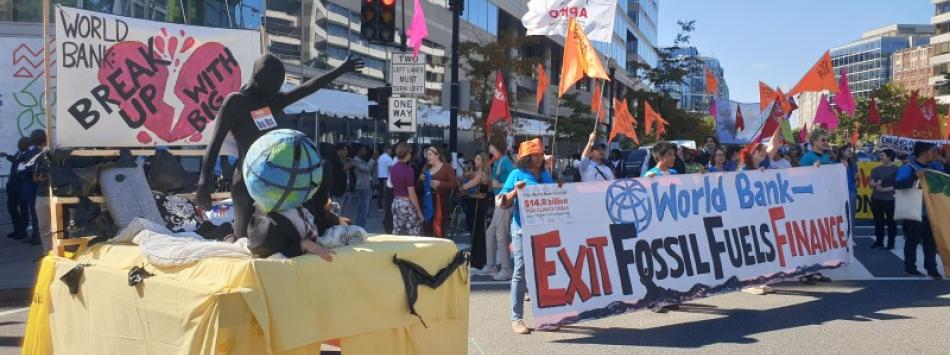The World Bank Group’s (WBG) Roadmap (that was leaked in December 2022) aims to respond to new global challenges of climate change, debt burdens, inflation and reversals in poverty reduction and was first discussed by the WBG Board on 11 January 2023. It contains a proposal to widen the institution’s Twin Goals of boosting shared prosperity and ending extreme poverty to encompass climate action.
Recourse asks, how can the roadmap proposal not include a single mention either of Paris alignment to keep global warming below 1.5C or of fossil fuels specifically?
Where’s the road to #ParisAlignment?
The roadmap proposes a third goal of “climate action” for the WBG. To do this surely it needs to explicitly tackle the climate emergency by aligning with the Paris Agreement goals and support the Multilateral Development Banks (MDBs) to agree on and implement their planned Paris alignment methodology? The WBG roadmap must significantly ramp up the bank’s ambition for direct, indirect and policy finance to truly support a just, sustainable, and renewable energy transition.
The roadmap needs to be clear on how it will catalyse the shift from dirty, fossil fuel-based economies to cleaner, inclusive and more equitable development; and in supporting those who are bearing the brunt of the climate crisis.
The roadmap refers to the WBG’s new Country Climate and Development Reports (CCDRs) as a possible basis of Country Partnerships for Climate and Development. But there is still exposure to fossil fuels in the CCDRs including fossil gas which emits greenhouse gases in the form of methane as well as CO2. As an example, the CCDR for Vietnam promotes fossil gas as a transition fuel in its Accelerated Decarbonisation Scenario.
Off the map: Fossil Fuels
The roadmap talks about climate mitigation challenges, which is about rapidly phasing out investment in fossil fuels such as coal, oil and gas. But nowhere in the roadmap does it explicitly rule out funding fossil fuels through direct or indirect finance including via financial intermediaries (FIs). It gives no mention of the over $16 billion that that is has spent on fossil fuel financing since the Paris Agreement.
Which way for Financial Intermediary Lending and Technical Assistance?
In fact, the roadmap states that it will review the ways the WBG mobilises private capital and resources more broadly. It calls for comprehensive solutions to deliver private capital enabling (PCE) and private capital mobilisation (PCM).
A significant WBG vehicle for mobilising and enabling the private sector is financial intermediary lending via the WBG’s private sector arm, the International Finance Corporation (IFC). This involves indirect loans or equity investments to third parties such as private equity funds or commercial banks, which then on-lend to sub-projects. It is by no means a silver bullet for development finance. This is because once an FI investment is approved, the IFC largely delegates the responsibility to assess and approve sub-projects to the FIs, which can expose them - and the IFC - to fossil fuels. It is imperative that the roadmap addresses indirect financing to FIs and rules out support to fossil fuels. And IFC must ensure that it discloses information about what sub-projects are financed by its FI clients, with very limited exceptions.
The roadmap also refers to the important role of technical assistance (aka Advisory Services and Analytics) in supporting transformative change. But in Recourse’s experience technical assistance can also be used to entrench the use of fossil fuels which will lead to environmental and climate impacts and stranded assets. Take for example the World Bank’s 2017/18 technical assistance to Vietnam for “Addressing the constraints on LNG investment in Vietnam” that has laid the ground for a massive expansion of gas in the form of LNG in a country where there was none, and where the potential for solar and wind energy is exceptional.
Getting back on course:
As a group of publicly funded and owned development institutions, the WBG must be held accountable to the global public and therefore act as agents of transformative change to tackle the climate emergency. In part, this means a shift from dirty, fossil-fuel based investments to inclusive, renewable and sustainable development that is consulted on democratically at a local level. The roadmap must lead to finance that does not entrench countries in unsustainable debt but is transparent and accountable, helping countries in pursuing equitable, environmentally sustainable, renewable energy transitions.
The WBG roadmap must end all support for fossil fuels, including coal, oil and gas and their associated infrastructure. To be meaningful the roadmap must also be transparent and made publicly available and open to engagement and consultation with civil society and affected communities.
This was originally published on Recourse LinkedIn page
Fran Witt, Campaign Manager, Recourse, 10 January 2023
